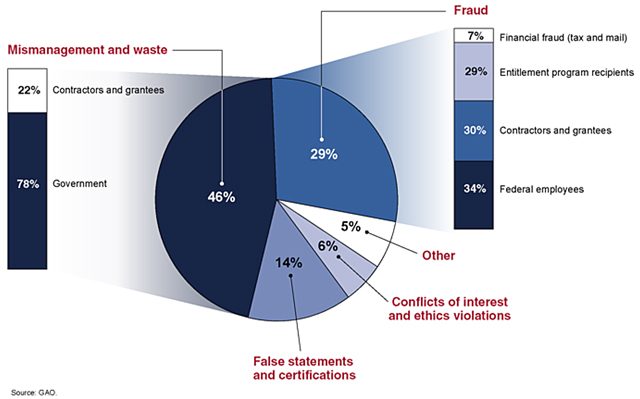What You Need to Know about FraudNet
- to protect that information from unauthorized disclosure, and
- to use that information to fight fraud.
 FraudNet in Action
FraudNet’s work has contributed to executive branch IG and GAO audits and investigations. For example:
FraudNet in Action
FraudNet’s work has contributed to executive branch IG and GAO audits and investigations. For example:
- FraudNet referred 3 cases to the Small Business Administration’s (SBA) IG. In these cases, contractors falsified information to gain access to programs intended to benefit service-disabled veterans and businesses located in historically underused business zones. Consequently, four companies that had received $11 million in contracts pled guilty to charges including wire fraud and misrepresentation.
- FraudNet staff performed substantial research that tracked registered sex offenders leaving and entering the United States. One of the recommendations from GAO’s report helped Immigration and Customs Enforcement and INTERPOL’s U.S. National Central Bureau share data to monitor sex offenders’ international travel.
- FraudNet staff provided GAO with information about people who applied for passports using the identities of dead or jailed individuals, as well as those with active felony warrants. In the course of completing the report, GAO referred some high-risk cases to the Department of State, which may help them strengthen the integrity of the passport program.
- FraudNet received allegations regarding potential fraud and abuse in the National School Lunch Program. GAO’s work following up on these allegations led to recommendations in a GAO report for improving integrity and oversight of the school-meals programs.
- Questions on the content of this post? Contact Steve Lord at LordS@gao.gov.
- Comments on GAO’s WatchBlog? Contact blog@gao.gov.

GAO's mission is to provide Congress with fact-based, nonpartisan information that can help improve federal government performance and ensure accountability for the benefit of the American people. GAO launched its WatchBlog in January, 2014, as part of its continuing effort to reach its audiences—Congress and the American people—where they are currently looking for information.
The blog format allows GAO to provide a little more context about its work than it can offer on its other social media platforms. Posts will tie GAO work to current events and the news; show how GAO’s work is affecting agencies or legislation; highlight reports, testimonies, and issue areas where GAO does work; and provide information about GAO itself, among other things.
Please send any feedback on GAO's WatchBlog to blog@gao.gov.
